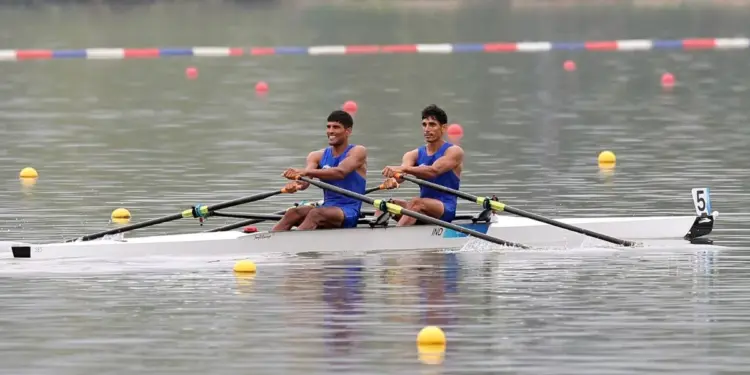Khelo India Water Sports: Charting a Pan-India Voyage from Kashmir to Kanyakumari

From serene lakes to majestic rivers, India’s youth are poised to make waves on the Olympic stage
India is steadily making its mark on the global sports map and water sports are emerging as a key avenue for nurturing talent and achieving Olympic glory. The recent Khelo India Water Sports festival held in Srinagar, Jammu & Kashmir from August 21-23, 2025 marks an important milestone in the journey of this country toward realizing this vision. By choosing Dal Lake as the venue for this first-ever water sports edition under the Khelo India program, the Government of
Jammu & Kashmir, working closely with central sports authorities, has demonstrated its commitment to advancing sports while promoting tourism simultaneously. This initiative is a clarion call to young athletes across India to embrace water sports as a professional pursuit, while leveraging the abundant natural resources of India.
The festival showcased a range of disciplines, including kayaking, canoeing, and rowing, bringing together participants from multiple states. The presence of eminent sports authorities from both the Union and the State Government lent credibility and direction to the event, ensuring that planning, execution and athlete support were of the good standard. The proactive approach of Jammu & Kashmir Government in selecting such a prestigious platform for water sports has provided the perfect stage to highlight the scenic lakes and rivers of Kashmir, demonstrating how natural landscapes can be converted into sporting arenas that inspire both athletes and spectators. The central sports authorities’ involvement further affirms the significance of this first-ever national-level event, reflecting a vision that goes beyond regional considerations and positions India as a unified sporting nation with the potential for Olympic success.
While speaking with Bilquis Mir about the event, she highlighted India’s immense potential in water sports. A pioneer in the field and a jury member at the Paris 2024 Olympics, Bilquis observed the festival as Competition Manager and shared her insights on athlete development, training methodologies and infrastructure needs. She noted that India’s abundant natural water resources and youthful population could produce world-class athletes. With professional training programs, regular exposure to international competitions and expert coaching, she emphasized, the nation could emerge as a strong contender in multiple water sports disciplines at the Asian Games and Olympics. Her observations reinforce the notion that events like the Khelo India Water Sports festival are foundational long-term sporting strategy to India.
The festival also serves as a model for other states across the country. India is blessed with a wide variety of natural water bodies, lakes, rivers, reservoirs and coastal stretches that remain largely untapped for sports development. From Chilika Lake in Odisha, the expansive Vembanad backwaters in Kerala, and the Brahmaputra in Assam, to the Pong Dam in Himachal Pradesh, the Ganga in Rishikesh and the coastal waters of Tamil Nadu and Gujarat, every region offers a unique environment for water sports training and competitions. By creating a pan-India ecosystem where multiple water bodies are developed as sporting hubs, the central government and state authorities can ensure sustained talent growth and competitive excellence.
Central to this initiative is the vision of involving youth from all corners of India. The Olympic dream requires a national pool of athletes, and the strategy is clear: identify, train and expose young talent to international standards. By moving beyond singular events and expanding the reach of water sports to every state, India can cultivate a culture of excellence and instill a competitive spirit that aligns with global benchmarks. The role of government authorities, both at the state / UT and central levels, is crucial in providing infrastructure, training programs and financial support. Their coordinated efforts exemplify how strategic planning and execution can transform natural resources into arenas for national achievement.
The foresight of Jammu & Kashmir Government in hosting this event in Srinagar exemplifies how regional strengths can be leveraged for national gain. Dal Lake’s calm waters provided an ideal venue for athletes to hone their skills, while its scenic surroundings elevated the festival’s profile, attracting media coverage and public interest alike. The central sports authorities decision to actively support and supervise the event illustrates their recognition of the festival’s broader significance. This synergy between UT and national entities demonstrates a shared commitment to nurturing talent, building infrastructure and inspiring a generation of athletes who can aspire to international success.
Athlete development is at the core of this initiative. Structured training programs, as highlighted by Bilquis Mir, are essential to transform potential into performance. Her emphasis on expert coaching, exposure to competitive environments and disciplined practice highlights the importance of a systematic approach. India’s water sports landscape is evolving rapidly, but sustainable growth requires meticulous planning, investment in infrastructure and continuous monitoring. Government support, coupled with expert guidance, ensures that young athletes have the tools and opportunities necessary to excel at national and international levels.
Moreover, the festival sends a message about the transformative power of sports in uniting the country. By involving participants from across India, it promotes cultural exchange, teamwork and shared learning. Athletes from different regions can learn from each other’s experiences, adapt to diverse water conditions, and cultivate resilience and adaptability, qualities indispensable for international competitions. The pan-India nature of this initiative strengthens the foundation for a competitive sports culture, reinforcing the idea that excellence is achieved through collective effort, planning and continuous practice.
Water sports also offer broader societal benefits. They encourage environmental awareness, promote physical fitness and create opportunities for tourism and local economies. Kashmir, with its pristine lakes and rivers, has the potential to become a hub for both national and international water sports events. Similar possibilities exist across India, from Kerala’s backwaters to Odisha’s coastal lagoons. By prioritizing water sports and investing in infrastructure, governments can simultaneously achieve sporting, economic and cultural objectives.
The success of this festival is a testament to planning, supervision and the enthusiasm of participants. The central sports authorities’ involvement ensured adherence to national standards. Their guidance reinforced the importance of structured talent pathways, while the Jammu & Kashmir Government provided the logistical support necessary to create a sporting environment. Together, they have set a benchmark for future water sports initiatives, demonstrating how state and national collaboration can yield exceptional results. As India looks toward the Olympics, the Khelo India Water Sports festival serves as a stepping stone. It signals the nation’s intent to harness its natural resources, engage its youth and provide opportunities for athletes to compete at the highest level.
Looking forward, the challenge is to replicate this model across the country. States with untapped water bodies must be encouraged to develop facilities, train athletes and host competitions. By creating a network of regional hubs, India can ensure continuous talent development, while offering athletes diverse experiences across different water conditions.
The festival also emphasizes the importance of visibility and recognition. Media coverage, public engagement and government acknowledgment elevate the profile of water sports, motivating young athletes to pursue these disciplines seriously. By highlighting achievements, providing role models and creating aspirational pathways, the authorities inspire the next generation to dream big and work diligently. Water sports, once considered niche, are now emerging as a priority within India’s national sports agenda.
The Khelo India Water Sports festival in Srinagar represents a significant step in India’s journey toward Olympic excellence. It exemplifies how collaboration between the Jammu & Kashmir Government and central sports authorities can transform natural resources into platforms for national achievement. With insights from the experts and the enthusiastic participation of youth from across the country, the initiative promises to cultivate a culture of water sports excellence. By harnessing India’s diverse water bodies from Kashmir’s serene lakes to Kerala’s vast backwaters and beyond, the nation is charting a course that not only nurtures athletes but also inspires the country to aspire toward global sporting success. The festival is a model for pan-India engagement, a showcase of visionary planning and a testament to what India can achieve when talent, opportunity and strategic support converge. It is a celebration of youth, nature and ambition and a clear statement that India is ready to ride the waves toward Olympic glory.
The writer is an academician and Cultural Officer at the University of Kashmir. shahidkhandsw@gmail.com





